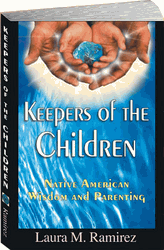|
www.childrenoftheearth.org |
|||
|
|
RECOMMENDED BOOK
|
Excerpt from a review written by Bob
Collier of Parental Intelligence:
In her book Keepers of
the Children, Laura Ramirez has combined
her expertise in child development with her understanding of Native
American perceptions and
the customs and rituals that have grown
from them to produce and
analysis of the art and science of successful
parenting that's both
comprehensive and highly original.
This is much more than a 'training manual' for the aspiring parent. It's
a deeply spiritual book
that explores important issues of human nature
and development that
transcend both Native American and 'western'
cultures. It will appeal
to parents of all races and creeds who desire
to expand their abilities
beyond the mere mechanics of 'child
management' to the attainment of true
parenting success.
This book once read, can be referred to again and again for good ideas,
for comfort and support,
for hope and inspiration. Virtually every page is
a reminder of something we can do as parents to make the
world a better place for our children and
for ourselves and others.
Here's an excerpt from a review by Marilee Niehoff, Ph.D. published in the July 2005 edition of AHP Perspectives. It was written from the perspective of a mother of five and practicing psychologist of thirty years. Keepers of the Children emphasizes the mutuality the author
identifies in
parent-child relationships. While other parenting
books may be overly
child-centered or focused on the parents'
actions, this book builds
a conceptualization of childrearing that
asks the parents to
engage in a process of self-analyzing where
they are in their own
spiritual journey. Critical to this process is the
entering into awareness
of how childrearing can be a vital aspect
of personal growth and
maturation for both parents and children.
She begins with a story and then urges her reader to reflect on what
kind of story they have
been creating for their child. In doing this, she
seeks to draw the parent
into a mode that operates from vision, rather
than from fear.
Throughout the book, she guides parents toward an
appreciation and
acknowledgement for their child's uniqueness. Giving
their child a secondary,
spiritual name can be an important symbol of
this.
Establishing healthy rhythms within family life also plays and essential
part in creating an
environment for this relationship to flourish. Ramirez
looks at the way discipline, the establishment of family
codes, ritual dialogue building and conscious commitment all form an
important process whereby "your child
becomes the muse to the sage in you and you become
the leaping-off point for your child."
As a mother of five children, four girls and a boy, I think this book is
excellent for the fact
that it sees parenting as an organic process, a
relationship that must be
constantly assessed and tended to as a living
thing. This is not a book
with stock answers about every child: rather, it
formulates the beginning of a process that will have unique
meanings and outcomes for each individual.
Developmental psychology has much to learn from Native American
philosophy as this book
seamlessly illustrates. The richness of the culture
lends itself to key insights which add depth and meaning to
the dialogue on parenting.
I have worked in developmental psychology my entire life and early on became sensitized to American indigenous culture as a deeply informing social, cultural, and spiritual resource. This book is an excellent starting place for people of all races, creeds and backgrounds to formulate questions that look on their own unique identity and tradition as an important resource for their growth and parenting process. As [the author] herself urges, "the time is ripe. The children await you."
|


